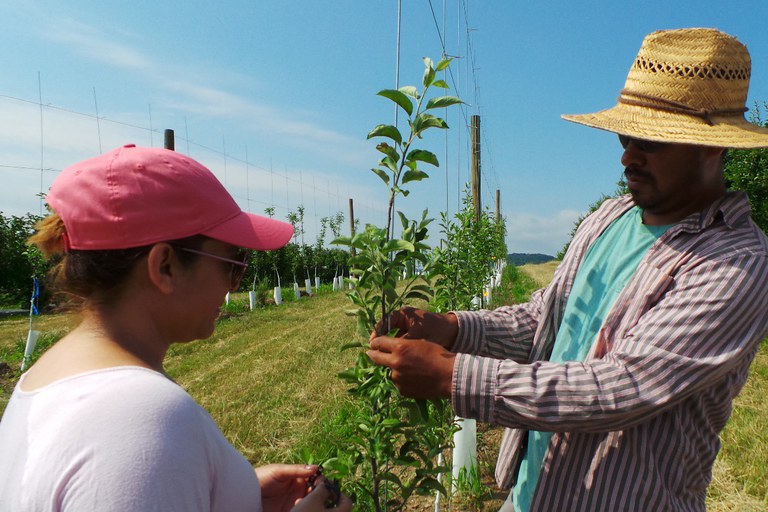A project conducted by Penn State Extension during 2014 to 2018 was designed to increase the diversity and success of beginning farmers in Pennsylvania.
Penn State Extension Team Members:
Tara Baugher, Lee Stivers, Marley Cassidy, Patty Neiner, Megan Chawner, Bob Pollock, Rob Crassweller, Lynn Kime, Maria Gorgo-Gourovitch, Montserrat Fonseca Estrada, Kathy Salisbury, Mike Basedow
Grower Cooperators:
Lisa Miskelly, Anton Shannon; Good Work Farm; Jake Scholl, Scholl Orchards; Joseph Bozzelli, Five Elements Farm; Dave and Art King, Harvest Valley Farms; Arturo Diaz, Jesse King, Michael King, Twin Springs Fruit Farm; Brett Saddington, Bedminster Orchard; Corey McCleaf, Vicky McCleaf, McCleaf's Orchard
Leading Pennsylvania's economy with $7.4 billion in sales each year, Pennsylvania's future depends on agriculture. Yet, the farming population is aging, and 16,000 Pennsylvania farmers are projected to retire in the next ten years. A project conducted by Penn State Extension during 2014 to 2018 was designed to increase the diversity and success of beginning farmers in Pennsylvania. The project was supported by a USDA NIFA Beginning Farmer and Rancher Program grant titled "Supporting Pennsylvania New Farmers in the Start-up, Re-strategizing and Establishing Years." The focus was on a group previously not specifically served - young, Hispanic/Latino, and women farmers in years 2 to 10 who are establishing their businesses. The program consisted of four main program areas:
- "Models for the Future" On-farm Demonstrations
- Study Circle Networks
- New Commercial Fruit Grower Courses
- Support for "Women in Ag" and for Hispanic/Latino Horticulturists
Seven on-farm demonstrations provided living classrooms where young and minority farmers experienced and learned cutting-edge best management practices in the context of working farms. Six study circle learning networks provided opportunities for new farmers and educators to learn from each other and from on-farm demonstrations. New commercial fruit grower courses provided new and minority producers with in-depth knowledge on starting a fruit business. Additional study circle networks provided support specific to the needs and learning preferences of women and Hispanic/Latino farmers. Information gathered and demonstrated through model plots and study circles was used to create new farmer-specific educational materials in Spanish and English and reach a national bicultural community of new farmers.
Case studies and interactive budgets for the model plots are posted at the project website to expand outreach to farmers from diverse backgrounds on rotation cover crops and other sustainable production practices. A series of "Learn Now" videos on topics such as site preparation and crop scouting are available in Spanish and English. Seventy-one Study Circles were held for 702 establishing farmers, and 70% of participants who completed post-program surveys (n=454) said they planned to adopt a new practice. Thirty-four percent indicated they were limited resource stakeholders, and 59%, socially disadvantaged. Seventy percent increased knowledge in an area that will increase crop productivity; 25%, environmental sustainability; and 75%, profitability. Follow-up surveys conducted near the end of the project indicated adoption rates were 61% for Women in Ag farmers (n=254), 90% for Hispanic/Latino farmers (n=32), and 100% for new commercial fruit growers (n=30).


